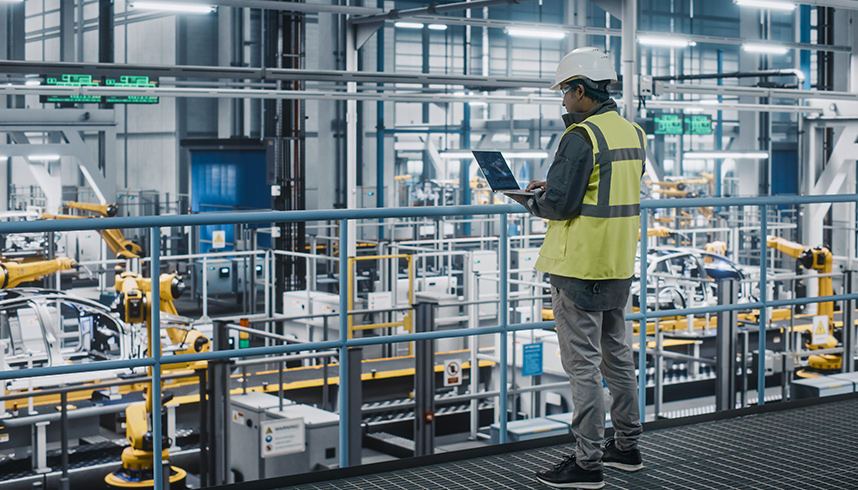
Age of Human-Centric Technologies: What Does Industry 5.0 Mean?
We are curious about the concept of Industry5.0 that we often hear. Seen as the next step in industrialization, Industry 5.0 signifies an industrial transformation that works in collaboration with artificial intelligence and focuses on human-centered approaches. Let's delve a bit deeper into this concept.
What is Industry 5.0?
As a complement to the approach of Industry 4.0, Industry 5.0 signifies the collaboration between humans working alongside robots and smart machines, integrating the dynamics introduced by artificial intelligence into our lives. These robots, leveraging advanced technologies such as the Internet of Things (IoT) and big data, aid humans in working better and faster. Unlike Industry 4.0, this concept incorporates an "human touch" to the foundations of automation and efficiency.
The European Commision defines Industry 5.0 as follows: "Industry 5.0 provides a vision that strengthens the industry's contribution to society. It places humans at the center of production, utilizing new technologies to ensure well-being while respecting the planet's production boundaries." Industry 5.0- also known as the "future industry- signifies a structure that progresses alongside artificial intelligence, focusing on humans, sustaining research and resilience in the face of unforeseen circumstances. Industry 5.0 represents a transformation that shifts focus from economic value to societal welfare in short.
What benefits does Industry 5.0 offer to companies?
Industry 5.0 offers several advantages to companies from a strategic standpoint, which can be categorized into three main areas:
Human-Centricity
In the Industry 5.0 approach, it's not about "robots replacing humans" but rather "robots assisting humans." This human-centric strategy encourages skills, diversity and empowerment. It highlights the value of human intuition and problem-solving abilities for manufacturers. While robots offer numerous benefits, they lack the adaptability and critical thinking skills that define us as humans. Collaborative robots, however, aim to assist us and improve our lives. Universal Robots, emphasizing the importance of humans in robot technology, coined the term "cobot" derived from the word "collaboration."
“In the Industry 5.0 approach, it's not about ‘robots replacing humans’ but rather ‘robots assisting humans’.”

These developments signify a shift in perspective from organizations serving humans to organizations serving alongside humans. Companies adopting the Industry 5.0 approach aim not only to gain a competitive advantage but also to create unique value for their employees.
Resilience
In the Industry 5.0 approach, the focus is not solely on profit, growth and efficiency. It emphasizes being more flexible, less fragile and operating within more robust structures. The world has faced continuous crises, such as the significant impact of the Covid-19 pandemic and consecutive wars reshaping the global agenda in recent years. Accordingly, Industry 5.0 prioritizes a company's ability to anticipate, respond, learn from crises, be more agile and thus sustain stable and resilient performance.
Unexpected developments could lead to consequences such as depleted stocks or shifts in demands. Companies might need to respond more rapidly and manage processes more accurately. Companies adept at managing crises can better adapt to volatile market conditions. Industry 5.0 urges businesses to think about how they can survive in a variable and uncertain environment.
Sustainability
Many companies have included sustainability-focused initiatives in their business strategies, aiming to minimize damage and reduce environmental harm. Industry 5.0, however, advocates for complete integration of sustainability into a company's strategy. Being a genuinely sustainable company means focusing on increasing positive impacts on the environment rather than just reducing negative ones.
Within the innovative perspective of sustainability in Industry 5.0, two concepts emerge. One is the "Net Positive" business model, named by Paul Polman and Andrew Winston. Net Positive aims to amplify positive impacts on the environment, such as a company's efforts to reduce carbon emissions while simultaneously contributing to nature through initiatives like reforestation or investing in renewable energy.
The second concept related to this transformation is the idea of the "Green Swan" symbolizing unprecedented natural disasters significantly affecting ecosystems as coined by John Elkington. It denotes large-scale, extraordinary and often unpredictable events in the environmental and ecological domain, leading to social and economic effects. For instance, increased temperatures contributing to a rise in global diseases, resulting in compulsory human migrations and increased healthcare costs.
In a negative case, the technological advancements resulting from closer collaboration between humans and machines in Industry 5.0 could lead to innovations that reduce or positively change environmental impacts. For instance, platforms like ACSI Labs' FutureView combining artificial intelligence, cognitive science and metadata, work on various cases.
These cases simulate real-life green swan-like adverse events, allowing users to see the social and economic effects of making decisions when facing problems.
Industry 5.0 suggests that companies should not just be part of the problem but rather be part of the solution. Concepts like Net Positive and the Green Swan play significant roles in this transformation.
Pioneering Digital and Green Transitions
At SOCAR Türkiye with our robust sustainability vision, we're prepared for the future. The World Economic Forum (WEF) identified Petkim as the only manufacturing facility included in the "Global Lighthouse Network," recognizing it as a world leader in Industry 4.0 In 2020. STAR Refinery, also in the same field, was selected for the "Factories of the Future" becoming the world's first and only refinery to receive this award in 2021.
Our next goal is to lead the industrialization process of Industry 5.0, focusing on human-centered, digital and green transformations. We prioritize pioneering projects and business models that bring social, economic and environmental benefits. We are progressing with robust steps toward being one of Europe's leading petrochemical and integrated refinery facilities and production centers through sustainable investments, innovative technologies and digital transformations.
We work today for a better tomorrow.